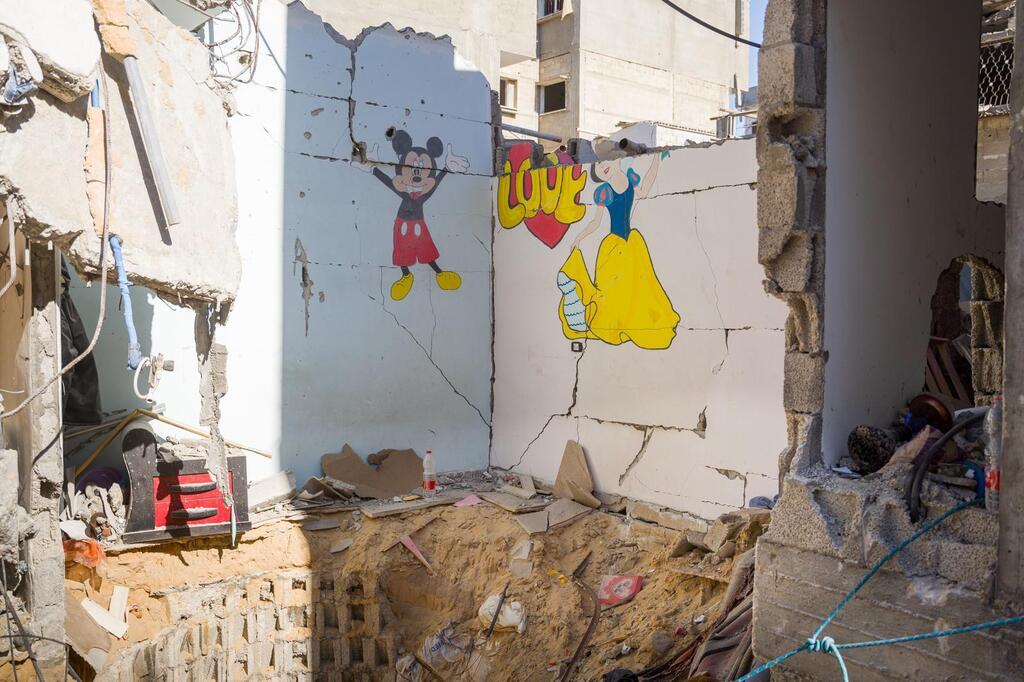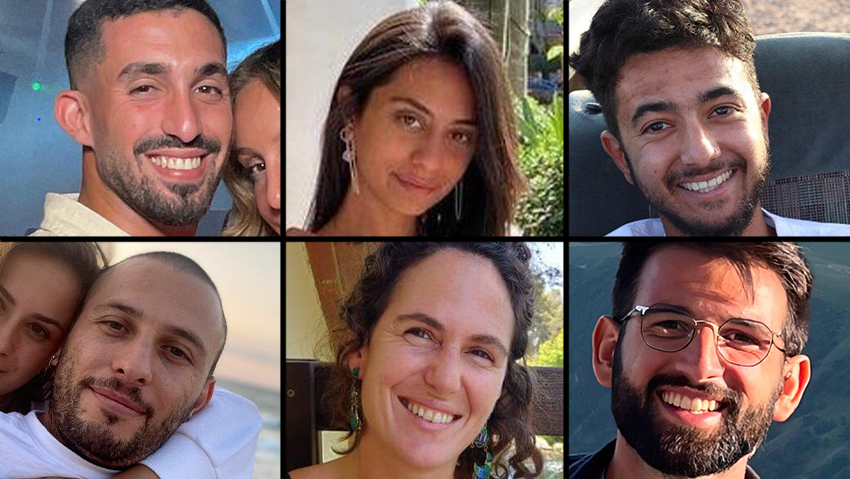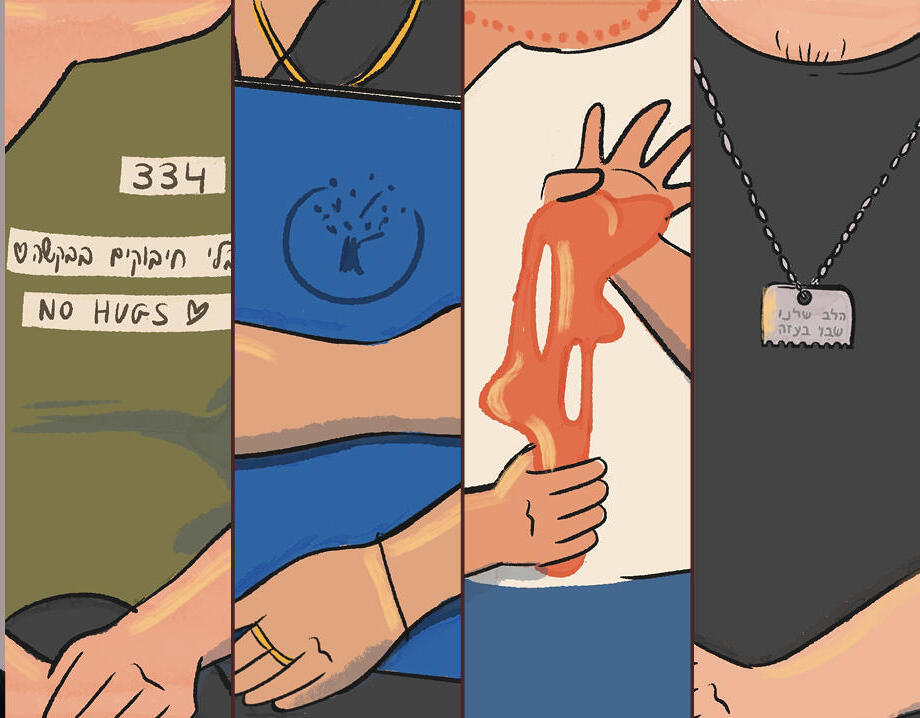Getting your Trinity Audio player ready...
At the end of last month, a heavy cloud of grief descended on us, and we've been trying to navigate it ever since. Not since the tragic events of October 7 have the days felt this heavy with sorrow. Everywhere you turn, the weight of loss is palpable.
As King Solomon wisely wrote, "It is better to go to a house of mourning than to a house of feasting, for death is the destiny of everyone; the living should take this to heart." In times of mourning, offering comfort carries more significance than sharing in joy.
3 View gallery


The entrance to the tunnel in which the hostages were held
(Photo: IDF Spokesperson's Unit)
This week, that comfort was not only for the families mourning their loved ones but for all of us. Along with illustrator Racheli Shilo, I visited four of the six families who lost their loved ones in Hamas tunnels. In these homes, we found not only deep sorrow but also a sense of resolve and unity.
First stop: Talpiot neighborhood, Jerusalem
At a junction surrounded by garages and next to a gas station, a large mourning tent was erected for the Goldberg-Polin family. Hundreds gathered for hours to offer condolences to Jon and Rachel, the parents of Hersh, who have become symbols of resilience.
Those who came sought to absorb the couple's strength and spirit, even if only exchanging a few words. The shiva resembled a carefully orchestrated event, with teams directing mourners, serving water and coffee and guiding guests to sign Hersh's memory book. Due to the overwhelming number of visitors, a note was placed on a table with a single word: "Lost." Sunglasses or water bottles might be found there, but where can a child lost forever be returned?
Despite their grief, Jon and Rachel make a point to look each visitor in the eye, listen and offer strength. They wear torn shirts, marked with a sticker reading "334," continuing to count the days of captivity, even after their son’s burial four days earlier. Their message to all who visit is clear: do not despair—keep fighting for those still held captive. Beneath the number on Rachel's shirt is another sticker: "No hugs, please," with a small heart drawn beneath it.
Among the crowd, families of other hostages also come to offer their condolences. Yarden Gonen, Romi's sister, received a long embrace from Rachel, while the Shem Tov couple, Omer's parents, held hands with Jon and Rachel. Their presence underscored the desperate hope that no more families fighting for the return of their loved ones will end up in mourning tents, though no such guarantees exist.
3 View gallery


From top left to bottom right: Ori Danino, Eden Yerushalmi, Hersh Goldberg-Polin, Alex Lobanov, Carmel Gat and Almog Sarusi
(Photo: Courtesy of the families)
The crowd was a mix of elderly and young, secular and religious, ultra-Orthodox and secular. English speakers, alongside Israelis in sandals, stood together. "I came here to find hope," said one visitor. "I came to ask for forgiveness," admitted another.
Standing before the Goldberg-Polins, I found myself at a loss for words in my brief moment with this remarkable couple, just before they took a break. All I could do was thank them for being an inspiring model of faith, love, and humanity. Israel is a tough place. It feels deeply unjust that we’ve come to know such extraordinary people under such tragic circumstances.
Second stop: Ramot neighborhood, Jerusalem
In the afternoon, a stream of uniformed girls from the Beit Yaakov school crosses the street as the day ends. Overlooking the scene on the mountainside stands the Neve Avraham synagogue, its walls covered in mourning notices for Ori Danino.
Ori, born into an ultra-Orthodox family, chose to enlist in the military and fought hard to become a paratrooper. He managed to flee the Nova music festival but returned to save friends he had met just hours earlier, only to be kidnapped with them. Ori's mother, Einav, is grief-stricken, struggling to speak, her overwhelming sorrow radiating all around her.
Next to a refreshment table, a sign invites mourners to bless the food for Ori’s soul and offers a place for charity donations. Ori’s 15-year-old brother teases his 12-year-old sister nearby, both laughing through their grief, their torn shirts reflecting the Jewish mourning tradition.
Hodaya, playing with sticky slime, mentions her upcoming bat mitzvah. How will they celebrate amid this tragedy? When asked what they needed most at that moment, Ori’s brother simply said, “Keep smiling—that’s what Ori was known for.”
Surrounding Ori's father, Rabbi Elchanan Danino, men read Mishnah and Psalms, offering quiet strength. When asked what message he wanted to share, Rabbi Danino was clear, "The words 'life' and 'price' do not go together. Life is priceless, as Rabbi Yosef said over my son's grave."
His white, torn shirt bears a sticker with Ori’s face, smiling brightly. "We must bring everyone back. No one should be abandoned. It’s strange to say we have a happy ending because Ori is with us now, but the worst is not knowing—remaining without an end. I ask for just one thing: bring back whoever can be saved."
Third stop: Beit Hashmonai
At the entrance to the settlement, three yellow chairs display numbers counting the days since October 7. The serene landscape of green trees and beautiful houses contrasts sharply with the sorrow in the air, even with the small, modest signs leading to the shiva. In the yard of Carmel Gat's aunt, men and women sit in circles—an eclectic mix, some strangers who don't know what to say or do. They just sit, listen and grieve.
Gil Dikman, Carmel's cousin, has become a prominent figure in the fight for the release of all hostages. At Sunday's massive demonstration in Tel Aviv, a heart-wrenching photo captured him standing alone on the Begin Bridge, head bowed, gazing at the crowd of hundreds of thousands demanding the return of the hostages—resembling Moses looking at the promised land.
“There’s a bitter sense of missed opportunity," Dikman says. "My mind, body, and heart still don’t grasp that she won’t return. Every morning, I have to remind myself. Even here at Carmel’s shiva, I keep reminding myself that she’s not here. We’ve been fighting with all our strength for months, and on Sunday we fought too. But when I thought of heading down to Ayalon, I just broke down in tears. I haven’t even had time to mourn my murdered aunt because I’ve been so immersed in the struggle.
"We don’t have closure. We don’t know what Carmel knew—did she know her niece survived? That her father is alive? That Yarden returned? These thoughts won’t leave me, and I hope that when all the hostages come home, we’ll find someone who was with her, who can tell us what she went through.”
Around Gil’s neck hangs a broken hostage dog tag. "I threw away half when Yarden was freed in the first phase," he explains. "The night they announced about Carmel, I wanted to toss the rest in the trash. For what? But I couldn’t. I put it back. We won’t have peace until we bring everyone home. People come here from all over the country, asking for forgiveness. And I tell them: join us in the fight."
Fourth stop: Ra'anana
As the sun sets over the orchid garden between the school and kindergarten on Pa’amonim Street, young men and women sit together—hugging, laughing and crying. Many have stood by the Sarusi family during the long months since Almog was taken, while others who never knew him have come to support their grieving friends and the family from Tiberias, Ness Ziona, Be’er Sheva and Jerusalem.
Almog’s mother, Nira, greets each visitor with a warm hug, proudly showing them his engineering degree certificate, holding it close to her heart. "The dean of Ariel University came here to give me this," she says. "I have a son with a degree, but he’s not with me."
An elderly neighbor recalls Almog as a mischievous, beautiful child running between the buildings, while his mother describes him as a charming young man and a natural leader. "Almog volunteered from a young age, and his dream was to open a home for at-risk youth. We will make that dream come true. He was a captivating person, always the first to stand up for others. He had friends everywhere, and they’ve been with us through these long months. No more parents should have to become bereaved. We were so close to hugging him again, but that hope was taken from us."
Almog’s father, Yigal, speaks with quiet, unwavering faith. "These six saints will tip the scales," he says with a mixture of sorrow and hope, "they will bring an end to our troubles."
***
In Israel, trauma runs deep, layered like the geological strata beneath the land. Since the devastating events of October 7, this collective pain feels like a ticking time bomb that could unravel us from within if left unaddressed. Yet, on Wednesday, the first day of the Jewish month of Elul, I witnessed the finest among us—people from every corner of the country and every part of society—demonstrating a deep sense of responsibility for one another. They love this land with all their heart and soul, striving to bring forth healing and comfort, to draw water from the stone.
Many commentators have pondered the meaning behind the poignant words in Ecclesiastes, "and the living will take it to heart." One interpretation speaks to the power of human compassion—the ability of those who console to keep the memory of the deceased alive in the hearts of their loved ones through their shared grief and support.



